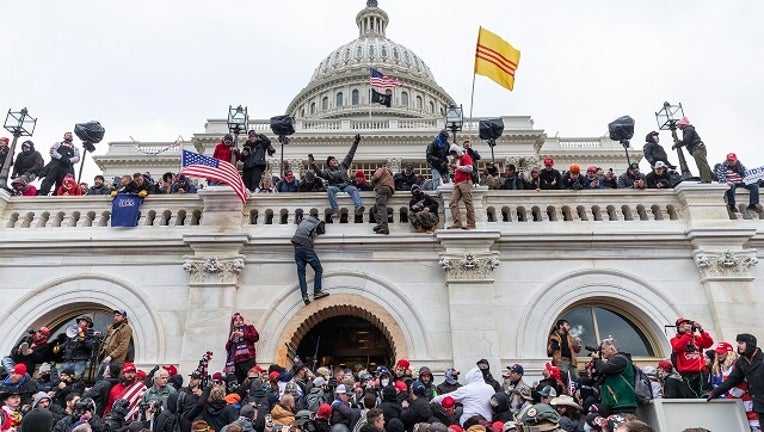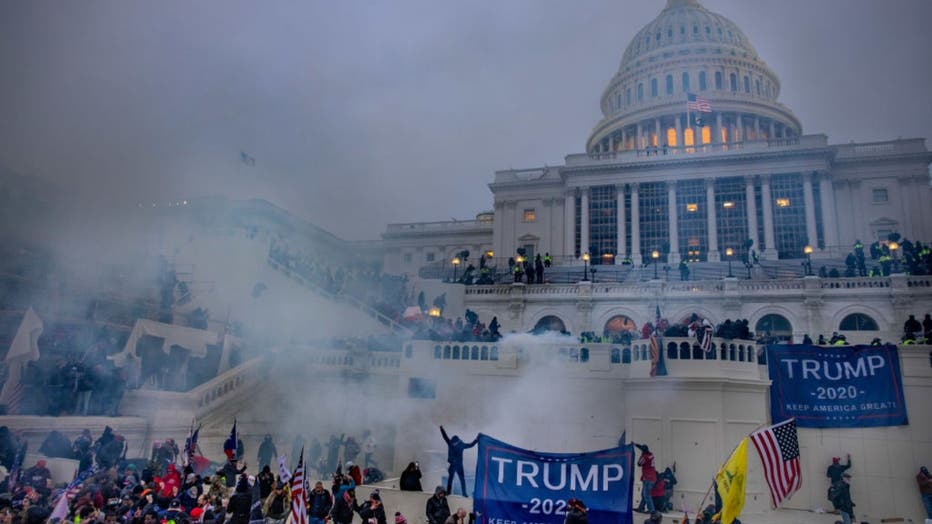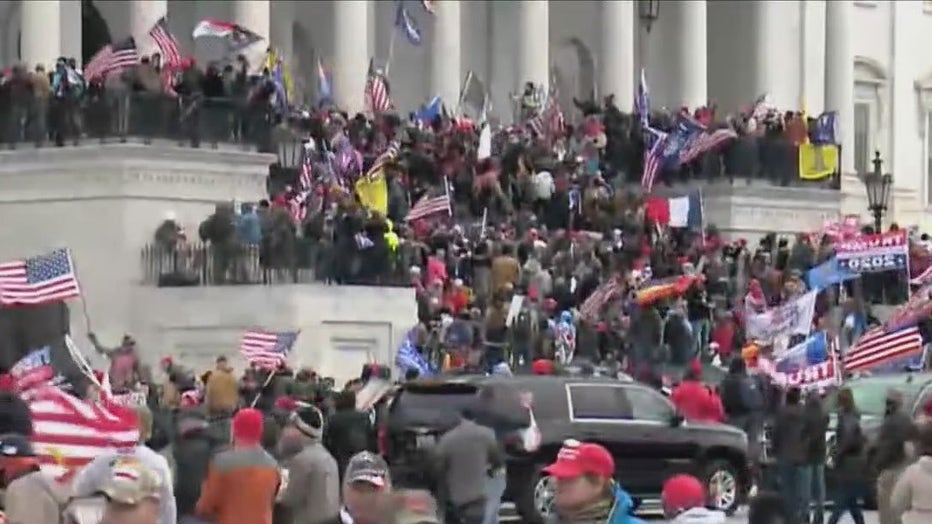Senate report details sweeping failures around Jan. 6 attack

WASHINGTON DC, DISTRICT OF COLUMBIA, UNITED STATES - 2021/01/06: Protesters seen all over Capitol building where pro-Trump supporters riot and breached the Capitol. Rioters broke windows and breached the Capitol building in an attempt to overthrow th
TALLAHASSEE - A Senate investigation of the Jan. 6 insurrection at the U.S. Capitol has uncovered broad government, military and law enforcement missteps before the violent attack, including a breakdown within multiple intelligence agencies and a lack of training and preparation for Capitol Police officers who were quickly overwhelmed by the rioters.
The Senate report released Tuesday is the first — and could be the last — bipartisan review of how hundreds of former President Donald Trump’s supporters were able to violently push past security lines and break into the Capitol that day, interrupting the certification of President Joe Biden’s victory.
It includes new details about the police officers on the front lines who suffered chemical burns, brain injuries and broken bones and who told senators that they were left with no direction when command systems broke down. It recommends immediate changes to give the Capitol Police chief more authority, to provide better planning and equipment for law enforcement and to streamline intelligence gathering among federal agencies.
As a bipartisan effort, the report does not delve into the root causes of the attack, including Trump’s role as he called for his supporters to "fight like hell" to overturn his election defeat that day. It does not call the attack an insurrection, even though it was. And it comes two weeks after Republicans blocked a bipartisan, independent commission that would investigate the insurrection more broadly.
"This report is important in the fact that it allows us to make some immediate improvements to the security situation here in the Capitol," said Michigan Sen. Gary Peters, the chairman of the Homeland Security and Governmental Affairs Committee, which conducted the probe along with the Senate Rules Committee. "But it does not answer some of the bigger questions that we need to face, quite frankly, as a country and as a democracy."

FILE - Tear gas is fired at supporters of President Trump who stormed the United States Capitol building on Jan. 6. (Evelyn Hockstein/For The Washington Post via Getty Images)
The House in May passed legislation to create a commission that would be modeled after a panel that investigated the Sept. 11 terrorist attack two decades ago. But the Senate failed to get the 60 votes needed to advance, with many Republicans pointing to the Senate report as sufficient.
The top Republican on the Rules panel, Missouri Sen. Roy Blunt, has opposed the commission, arguing that investigation would take too long. He said the recommendations made in the Senate can be implemented faster, including legislation that he and Minnesota Democratic Sen. Amy Klobuchar, the rules committee chair, intend to introduce soon that would give the chief of Capitol Police more authority to request assistance from the National Guard.
The Senate report recounts how the Guard was delayed for hours on Jan. 6 as officials in multiple agencies took bureaucratic steps to release the troops. It details hours of calls between officials in the Capitol and the Pentagon and as the then-chief of the Capitol Police, Steven Sund, desperately begged for help.
It finds that the Pentagon spent hours "mission planning" and seeking multiple layers of approvals as Capitol Police were being overwhelmed and brutally beaten by the rioters. It also states that the Defense Department’s response was "informed by criticism" of its heavy-handed response to protests in the summer of 2020 after the death of George Floyd at the hands of police.
The senators are heavily critical of the Capitol Police Board, a three-member panel that includes the heads of security for the House and Senate and the Architect of the Capitol. The board is now required to approve requests by the police chief, even in urgent situations. The report recommends that its members "regularly review the policies and procedures" after senators found that none of the board members on Jan. 6 understood their own authority or could detail the statutory requirements for requesting National Guard assistance.
Two of the three members of the board, the House and Senate sergeants at arms, were pushed out in the days after the attack. Sund also resigned under pressure.
Congress needs to change the law and give the police chief more authority "immediately," Klobuchar said.
The report recommends a consolidated intelligence unit within the Capitol Police after widespread failures from multiple agencies that did not predict the attack even though insurrectionists were planning it openly on the internet. The police’s intelligence unit "knew about social media posts calling for violence at the Capitol on January 6, including a plot to breach the Capitol, the online sharing of maps of the Capitol Complex’s tunnel systems, and other specific threats of violence," the report says, but agents did not properly inform leadership of everything they had found.
The senators also criticize the FBI and the Homeland Security Department for downplaying online threats and for not issuing formal intelligence bulletins that help law enforcement plan.

In a response to the report, the Capitol Police acknowledged the need for improvements, some of which they said they are already making. "Law enforcement agencies across the country rely on intelligence, and the quality of that intelligence can mean the difference between life and death," the statement said.
During the attack, the report says, Capitol Police were heavily compromised by multiple failures — bad intelligence, poor planning, faulty equipment and a lack of leadership. The force’s incident command system "broke down during the attack," leaving officers on the front lines without orders. There were no functional incident commanders, and some senior officers were fighting instead of giving orders. "USCP leadership never took control of the radio system to communicate orders to front-line officers," the investigation found.
"I was horrified that NO deputy chief or above was on the radio or helping us," one officer told the committee in an anonymous statement. "For hours the screams on the radio were horrific(,) the sights were unimaginable and there was a complete loss of control. ... For hours NO Chief or above took command and control. Officers were begging and pleading for help for medical triage."
Acting Chief of Police Yogananda Pittman, who replaced Sund after his resignation, told the committees that the lack of communication resulted from "incident commanders being overwhelmed and engaging with rioters, rather than issuing orders over the radio."
The committee’s interviews with police officers detail what one officer told them was "absolutely brutal" abuse from Trump’s supporters as they ran over them and broke into the building. They described hearing racial slurs and seeing Nazi salutes. One officer trying to evacuate the Senate said he had stopped several men in full tactical gear who said "You better get out of our way, boy, or we’ll go through you to get (the Senators).’"
The insurrectionists told police officers they would kill them, and then the members of Congress. One officer said he had a "tangible fear" that he might not make it home alive.
At the same time, the senators acknowledge the officers’ bravery, noting that one officer told them, "The officers inside all behaved admirably and heroically and, even outnumbered, went on the offensive and took the Capitol back."
Watch FOX 35 News for the latest updates.

